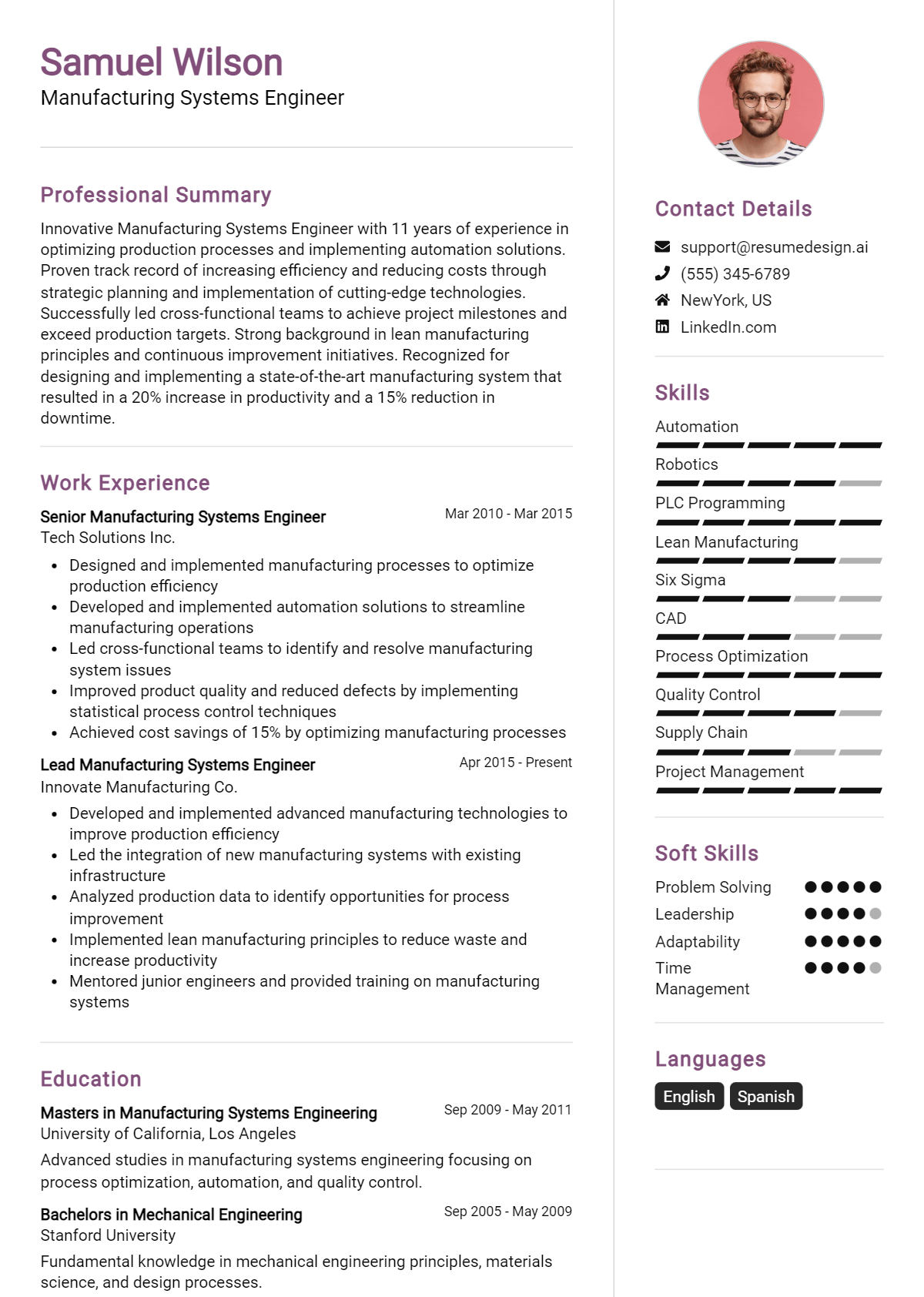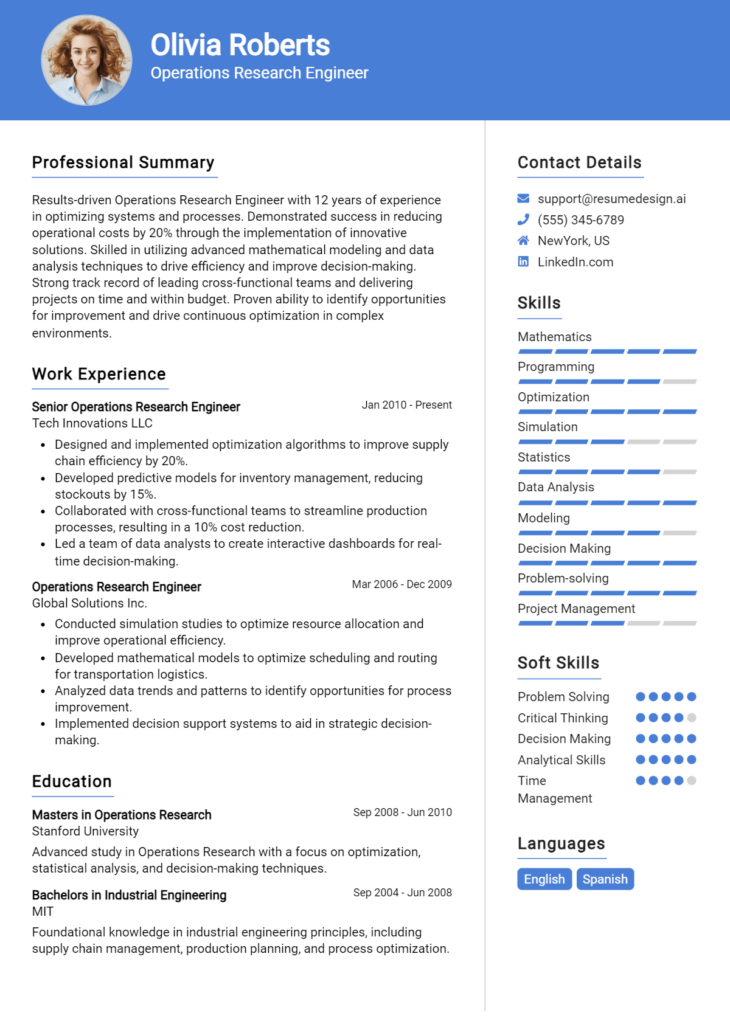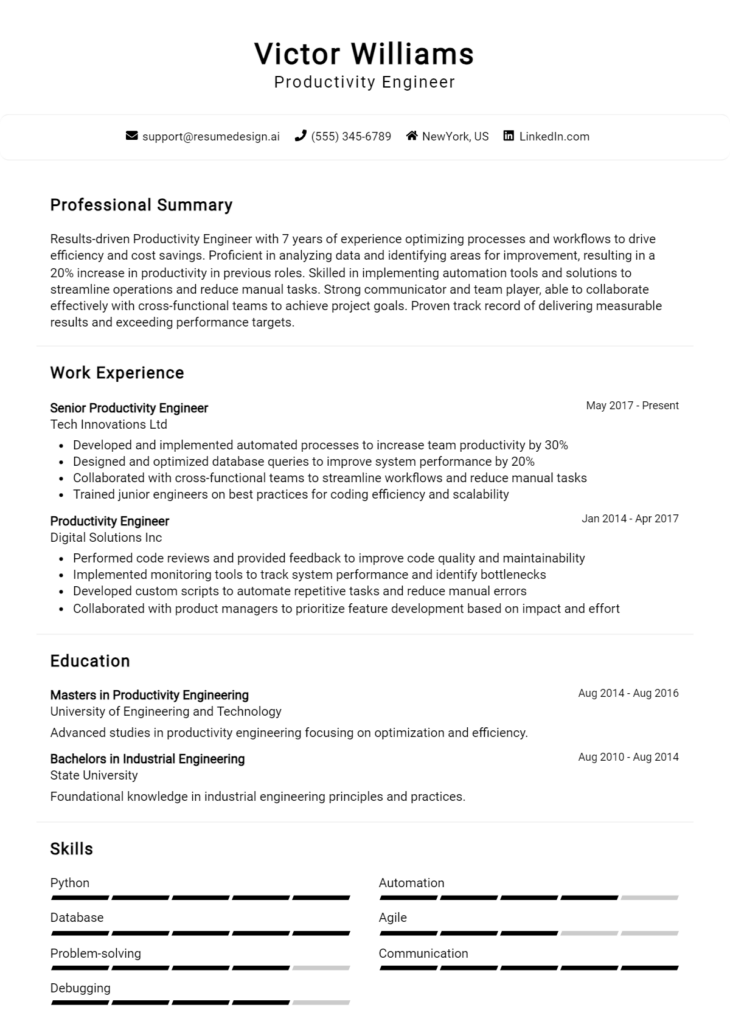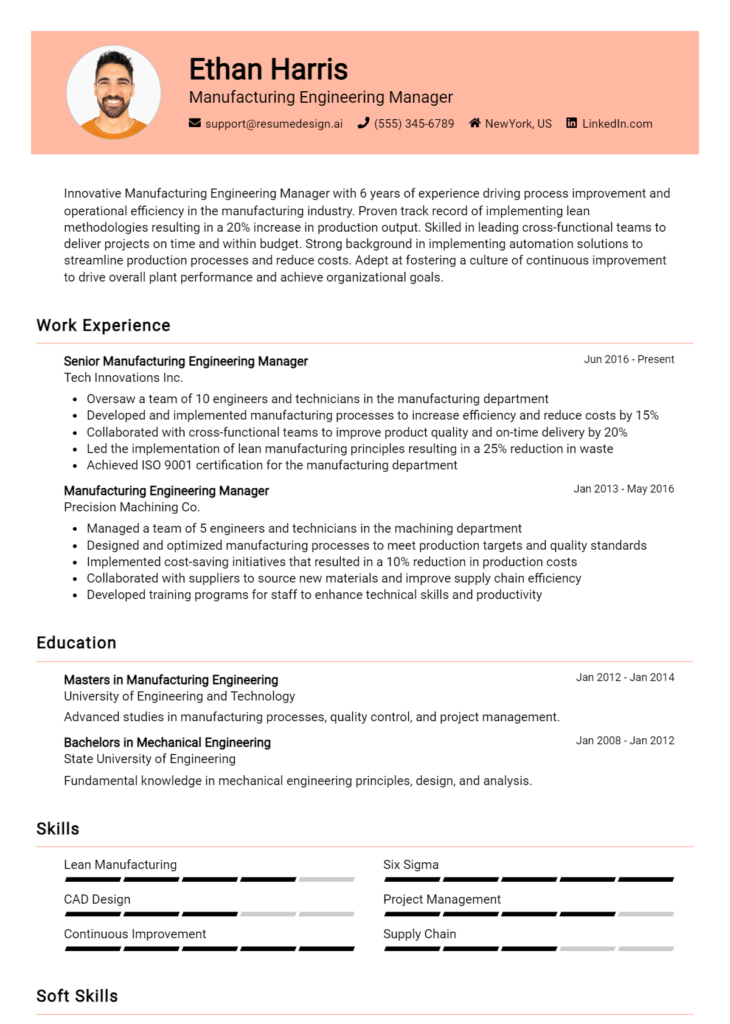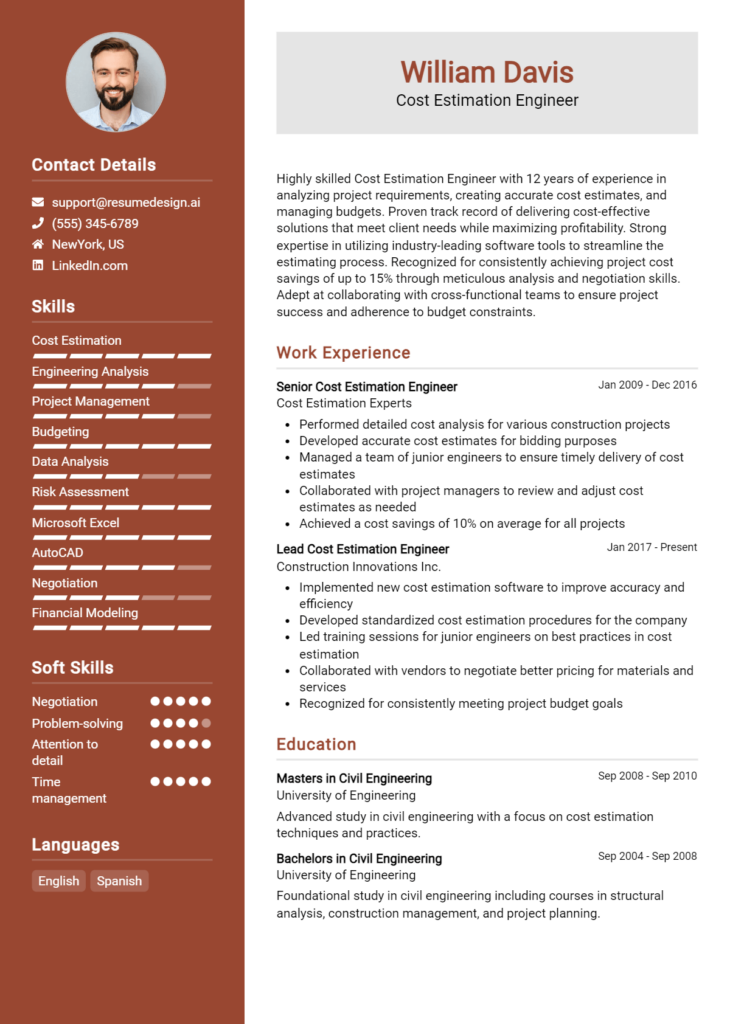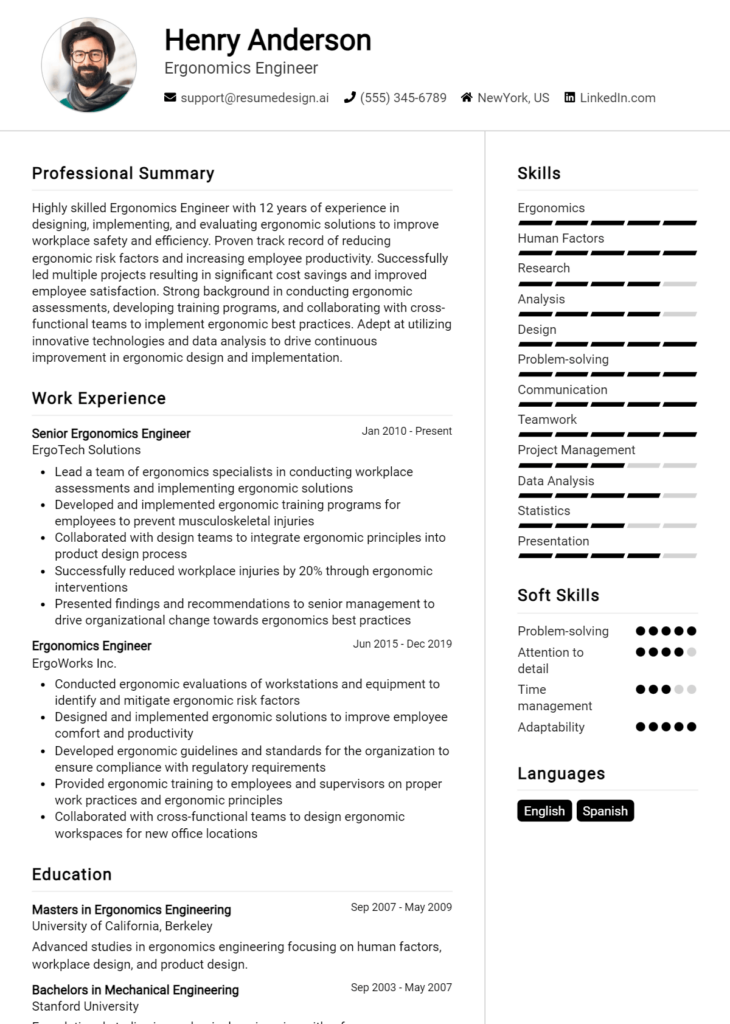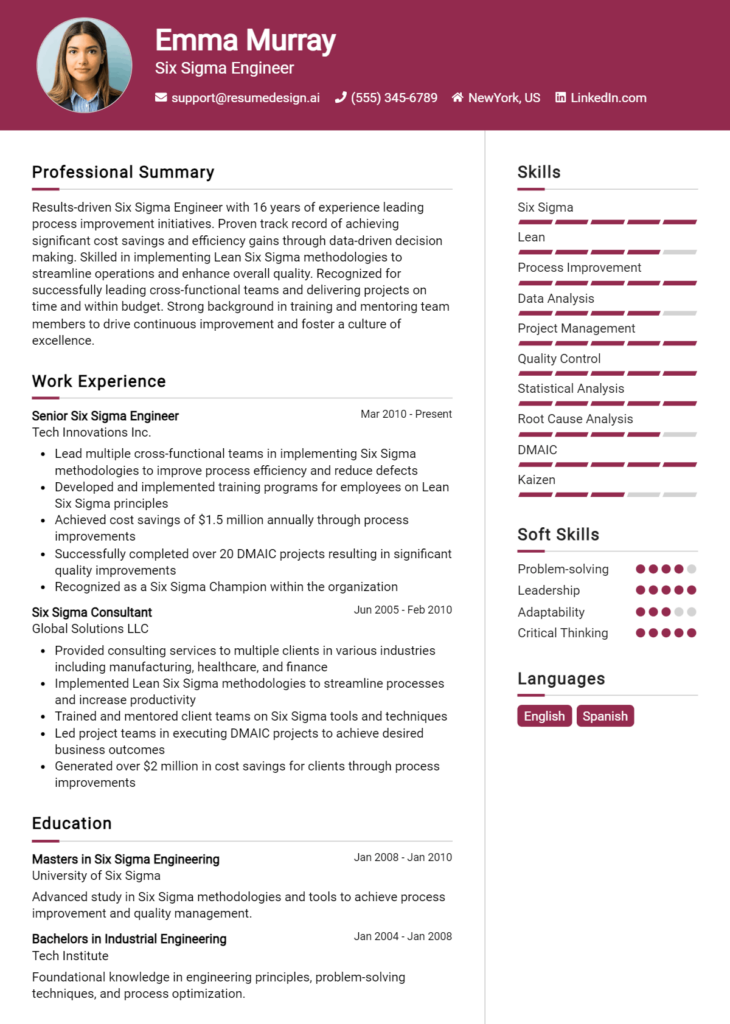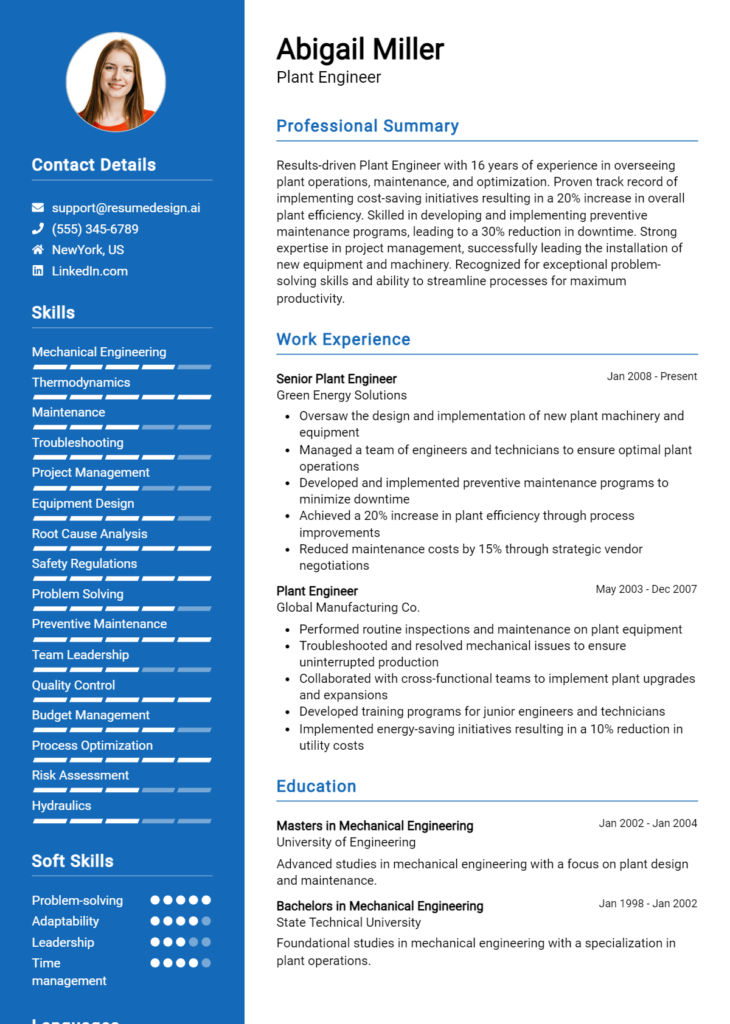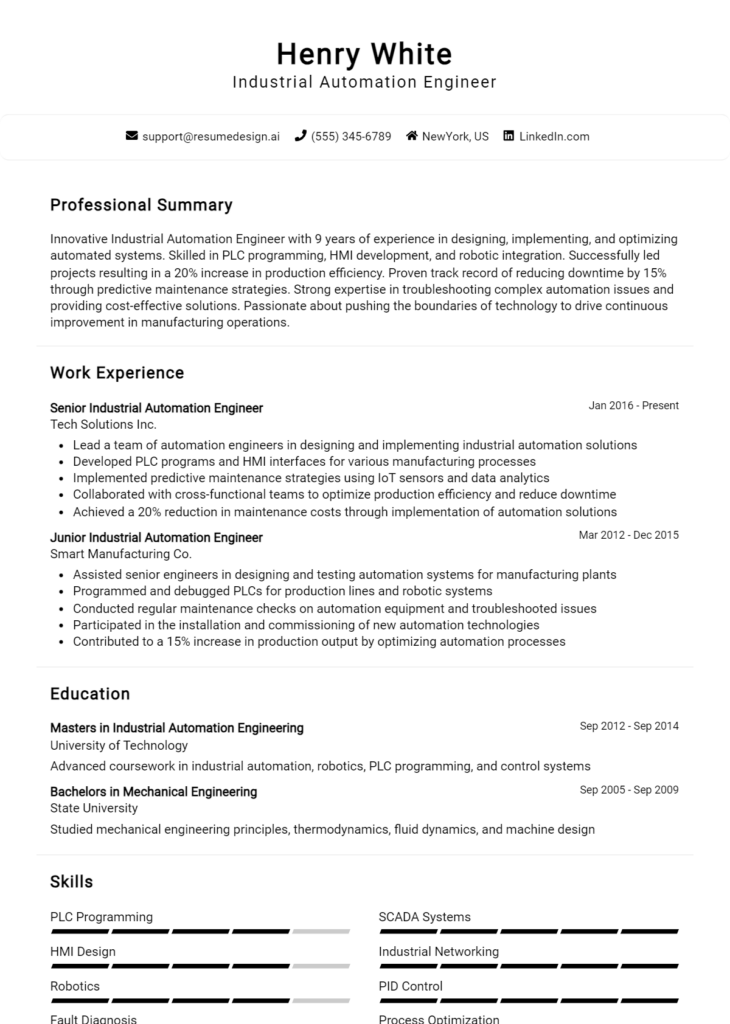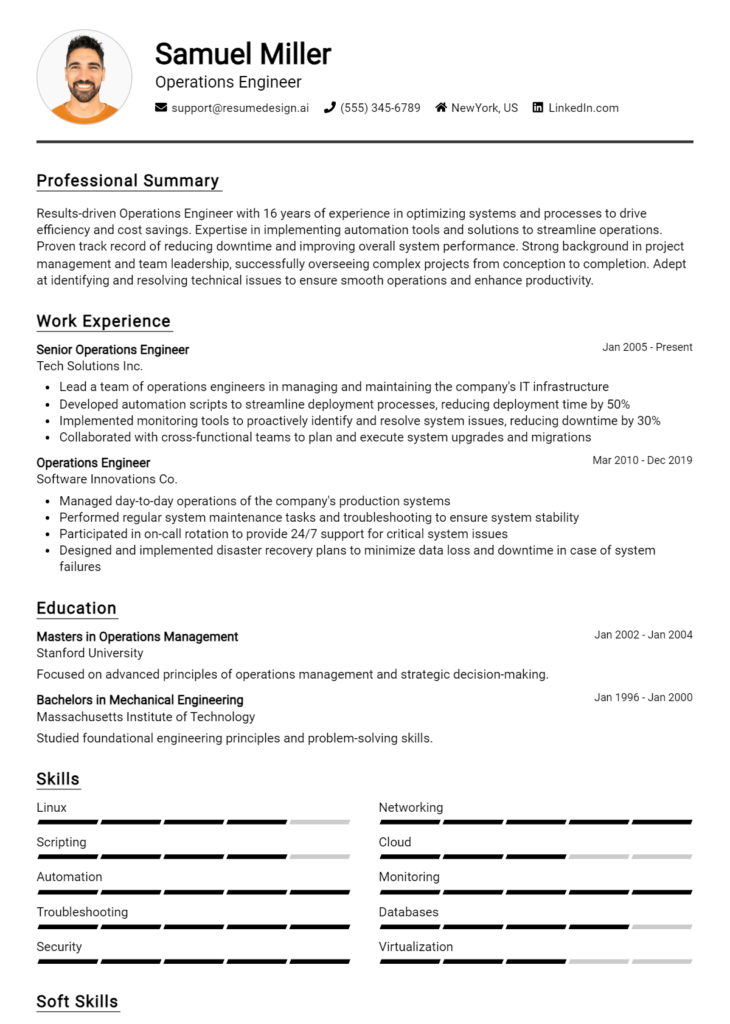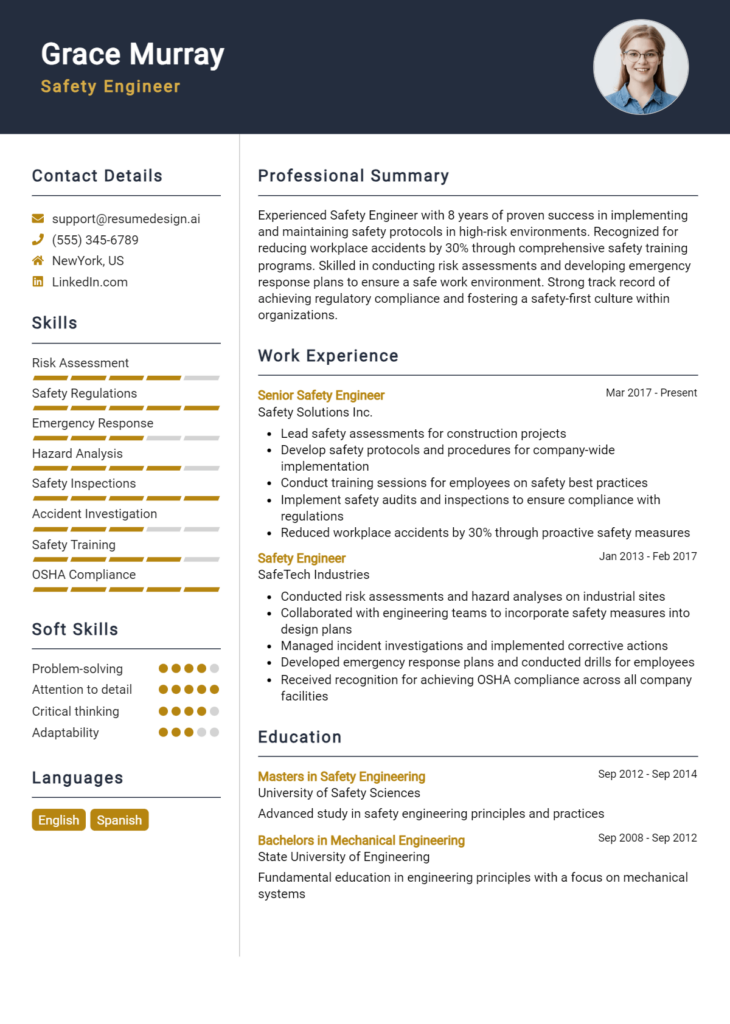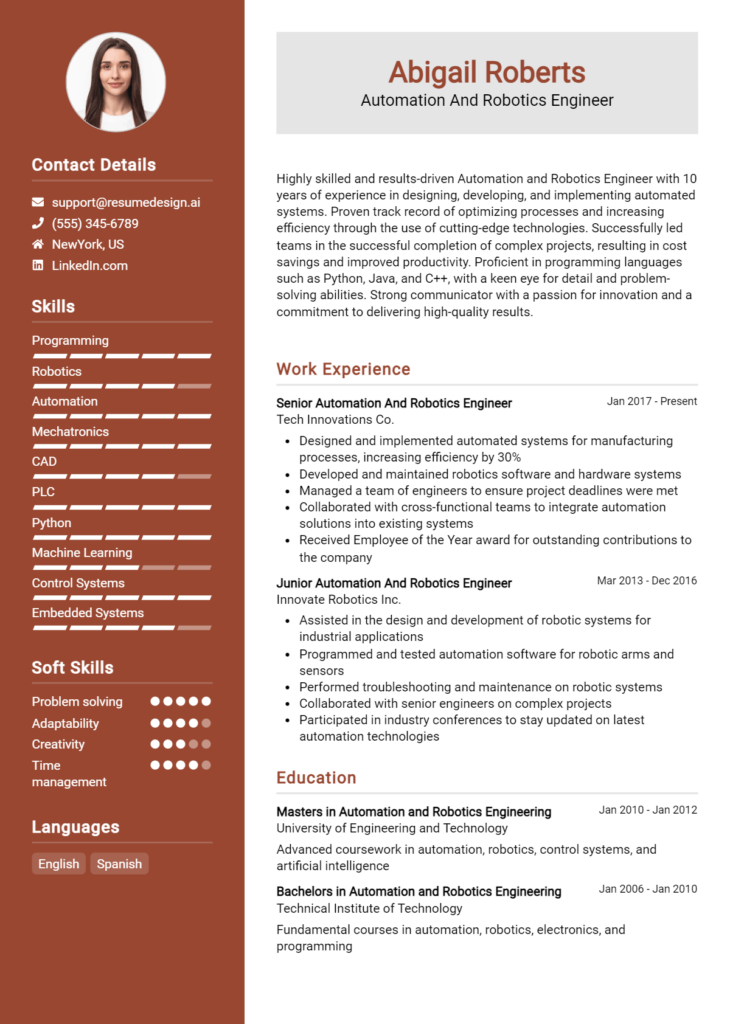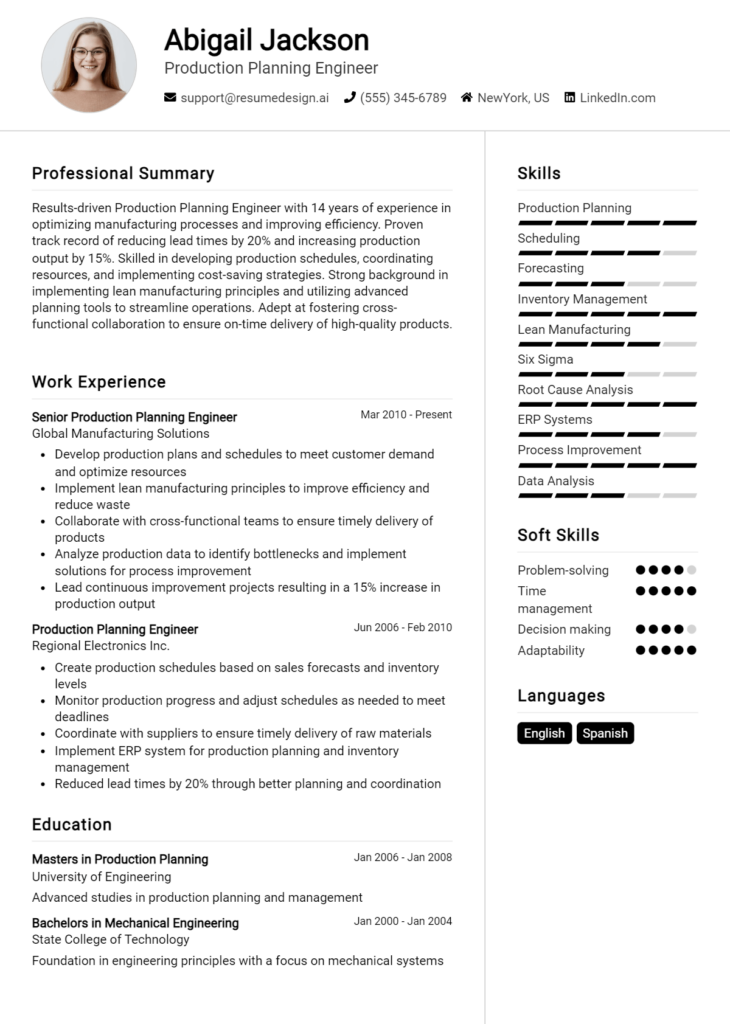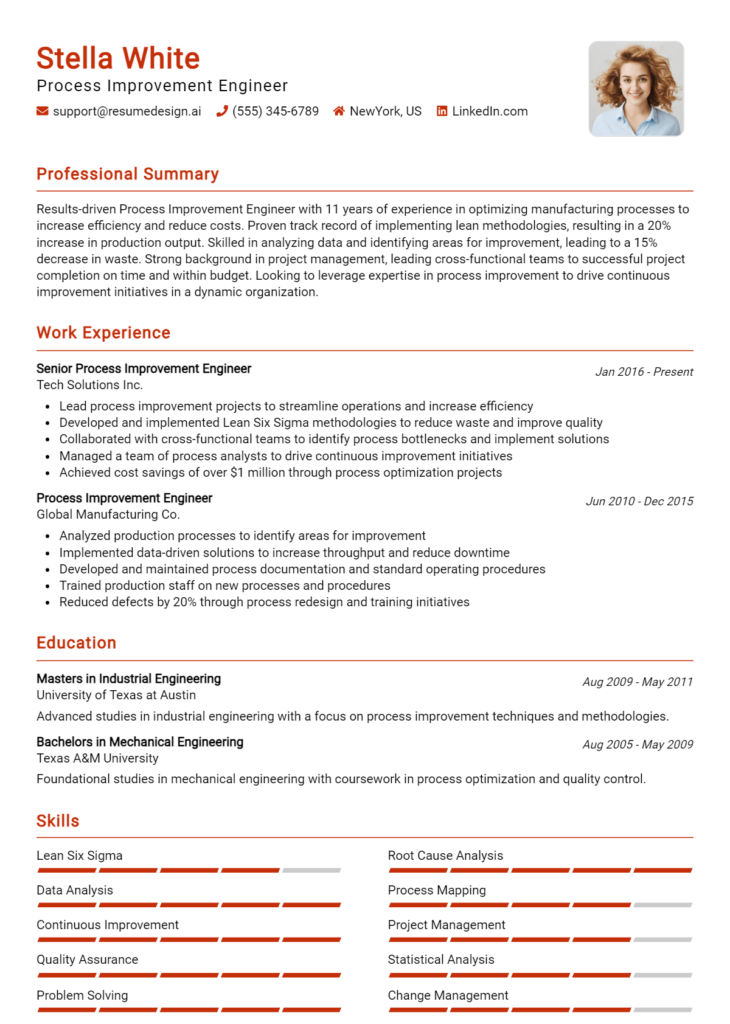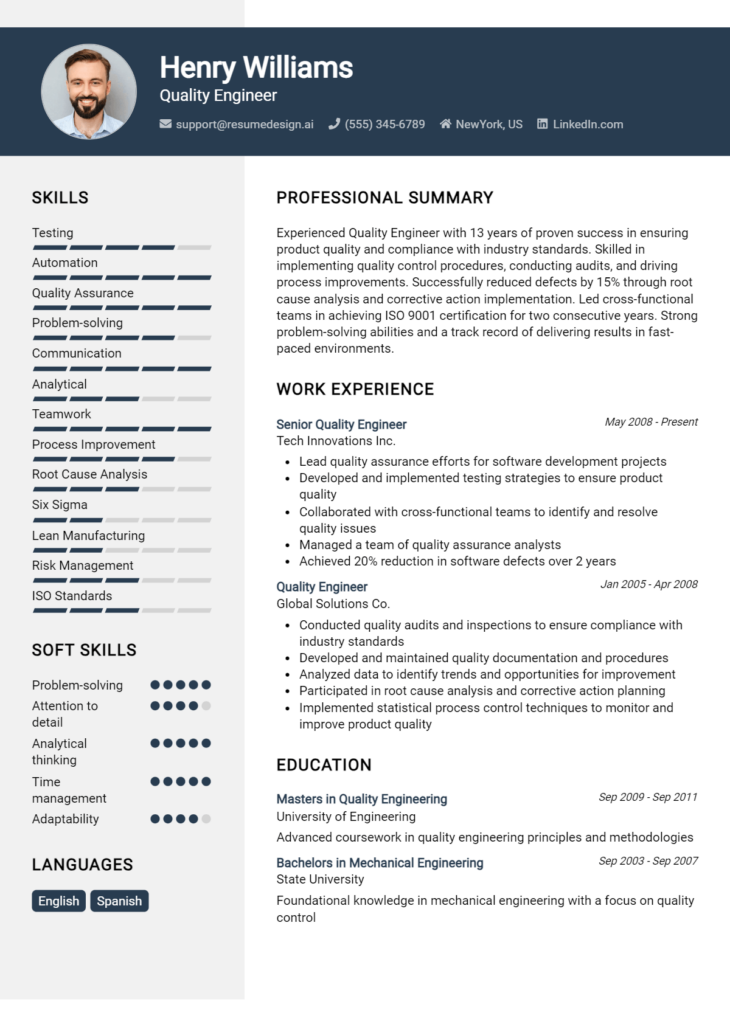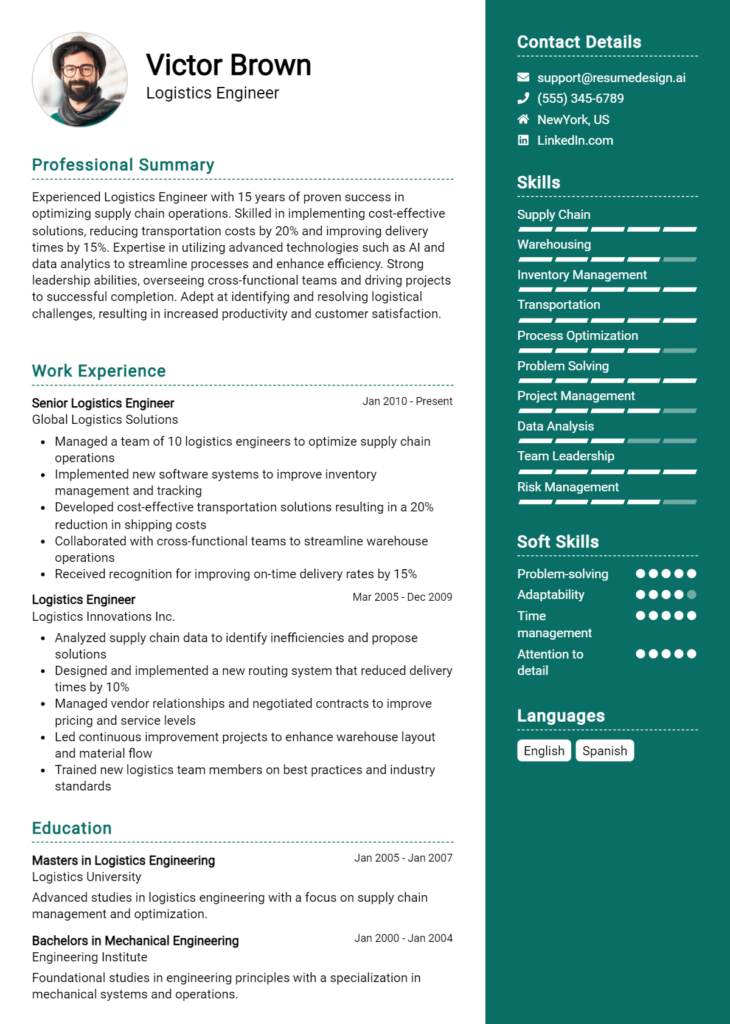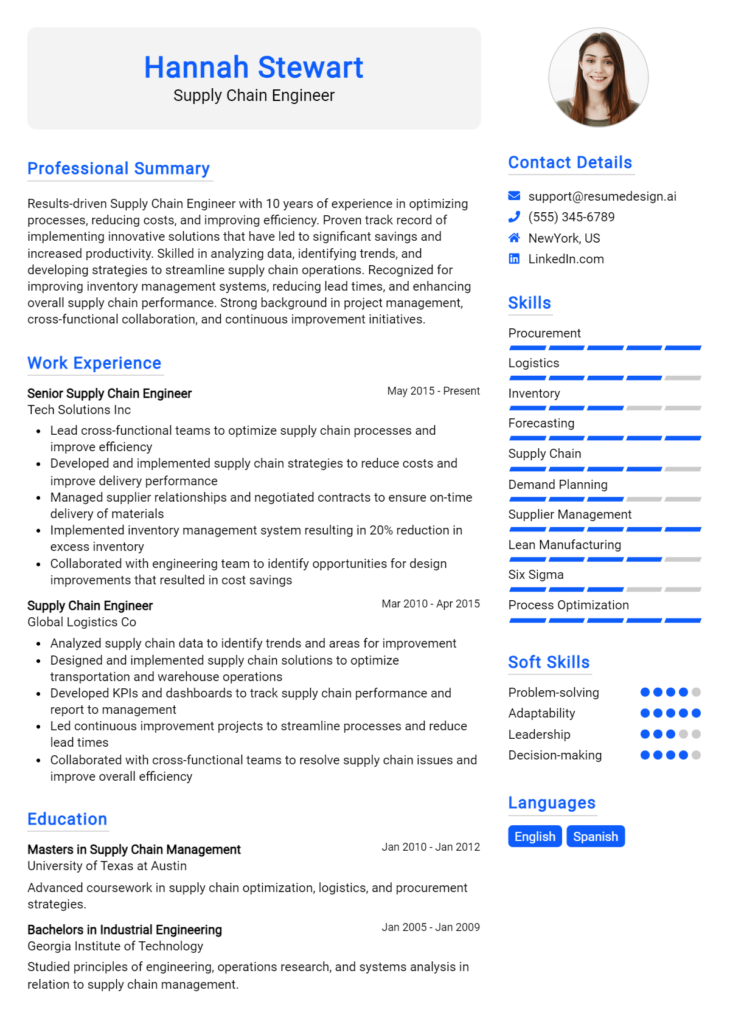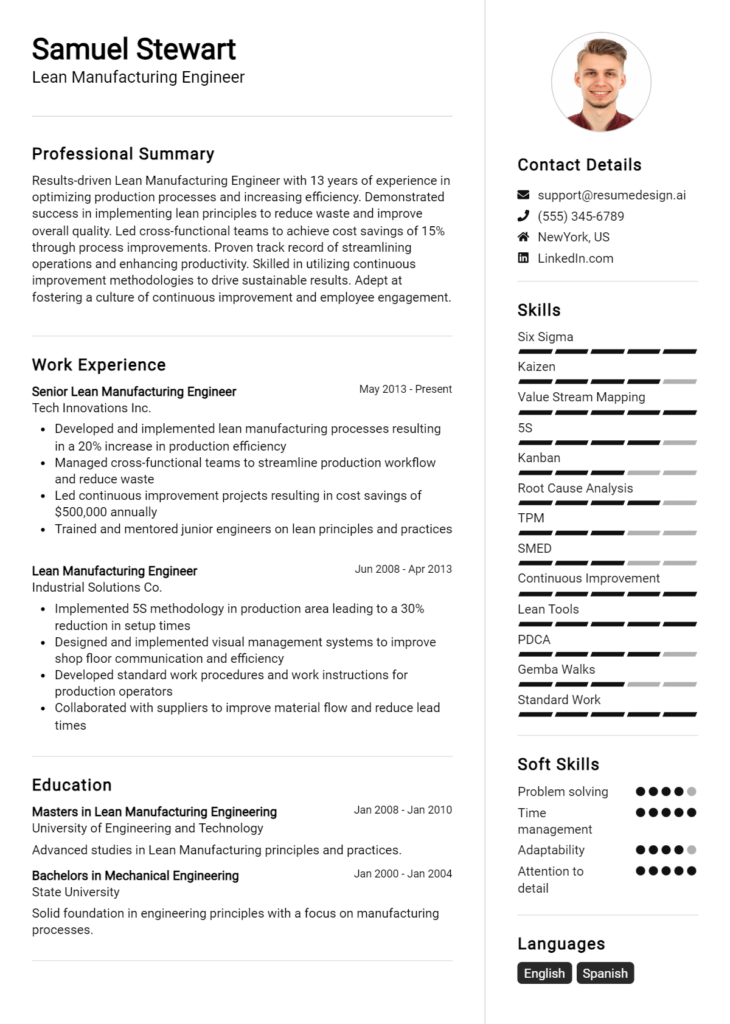Manufacturing Systems Engineer Core Responsibilities
A Manufacturing Systems Engineer plays a crucial role in integrating technical and operational elements across various departments, ensuring efficient production processes. Key responsibilities include analyzing manufacturing systems, optimizing workflows, and implementing automation solutions. Essential skills encompass strong technical knowledge, operational expertise, and robust problem-solving abilities. These competencies are vital for achieving organizational goals, enhancing productivity, and driving innovation. A well-structured resume can effectively highlight these qualifications, making a compelling case for the candidate's potential impact.
Common Responsibilities Listed on Manufacturing Systems Engineer Resume
- Analyze and improve manufacturing processes for increased efficiency.
- Collaborate with cross-functional teams including design, production, and quality assurance.
- Implement and manage automation systems and technology solutions.
- Conduct root cause analysis to resolve production issues.
- Develop and maintain documentation for engineering processes.
- Monitor performance metrics and suggest improvements.
- Ensure compliance with industry standards and regulations.
- Train staff on new systems and processes.
- Perform cost analysis and budget forecasting for engineering projects.
- Utilize simulation and modeling tools to predict outcomes.
- Support the integration of new technologies into existing systems.
- Participate in continuous improvement initiatives and lean manufacturing practices.
High-Level Resume Tips for Manufacturing Systems Engineer Professionals
A well-crafted resume is crucial for Manufacturing Systems Engineer professionals as it often serves as the first impression a candidate makes on a potential employer. In a competitive job market, your resume needs to effectively showcase not only your technical skills and experience but also your achievements and contributions to previous projects. It is essential that your resume reflects your understanding of manufacturing systems, your problem-solving abilities, and your commitment to efficiency and quality. This guide will provide practical and actionable resume tips specifically tailored for Manufacturing Systems Engineer professionals, helping you to stand out in your job search.
Top Resume Tips for Manufacturing Systems Engineer Professionals
- Tailor your resume to the job description by incorporating keywords and phrases that match the requirements of the position.
- Showcase relevant experience by highlighting projects that demonstrate your expertise in manufacturing systems, automation, and process improvement.
- Quantify your achievements with specific metrics, such as reduced production costs, improved efficiency percentages, or increased throughput.
- Highlight industry-specific skills such as Six Sigma, Lean Manufacturing, CAD software, and other relevant tools that are crucial in manufacturing environments.
- Include a summary statement at the top of your resume that encapsulates your professional identity and key qualifications.
- Utilize action verbs to describe your responsibilities and contributions, making your accomplishments more impactful.
- Keep your resume concise, ideally one to two pages, focusing on the most relevant and recent experiences.
- Incorporate certifications and training that are relevant to manufacturing systems to demonstrate your commitment to professional development.
- Use a clean, professional format that enhances readability, making it easy for hiring managers to quickly find key information.
Implementing these tips can significantly increase your chances of landing a job in the Manufacturing Systems Engineer field. By effectively showcasing your qualifications, experience, and achievements, you can create a compelling resume that captures the attention of hiring managers and sets you apart from other candidates.
Why Resume Headlines & Titles are Important for Manufacturing Systems Engineer
In the competitive field of Manufacturing Systems Engineering, crafting a standout resume is crucial for candidates aspiring to secure their desired position. One of the most effective ways to capture the attention of hiring managers is through a powerful resume headline or title. A strong headline serves as an immediate summary of a candidate's key qualifications, highlighting their most relevant skills and experiences in a concise manner. This impactful phrase not only piques the interest of hiring managers but also sets the tone for the rest of the resume, making it essential that the headline be both relevant and directly related to the job being applied for.
Best Practices for Crafting Resume Headlines for Manufacturing Systems Engineer
- Keep it concise: Aim for a headline that is brief yet informative, ideally one sentence.
- Be role-specific: Tailor your headline to match the job title you are applying for.
- Highlight key strengths: Focus on your most impressive skills or achievements that are relevant to the position.
- Use strong action words: Begin with powerful verbs that convey your expertise and impact.
- Avoid jargon: Ensure clarity by avoiding overly technical terms that may confuse hiring managers.
- Include metrics if possible: Quantify your accomplishments to demonstrate effectiveness.
- Make it compelling: Aim to evoke interest and curiosity about your background.
- Stay professional: Maintain a formal tone that reflects your professionalism in the engineering field.
Example Resume Headlines for Manufacturing Systems Engineer
Strong Resume Headlines
"Experienced Manufacturing Systems Engineer with 10+ Years in Process Optimization and Lean Manufacturing."
"Proven Track Record in Implementing Automated Solutions for Increased Production Efficiency."
“Results-Driven Engineer Specializing in Robotics Integration and Quality Assurance.”
“Innovative Manufacturing Systems Engineer with Expertise in Data Analysis and Continuous Improvement.”
Weak Resume Headlines
“Engineer Looking for Opportunities.”
“Manufacturing Systems Engineer with Some Experience.”
The strong headlines listed above are effective because they convey a clear message about the candidate's qualifications and specific areas of expertise, instantly capturing the attention of hiring managers. They highlight relevant experience and accomplishments, making the candidate stand out in a crowded field. Conversely, the weak headlines fail to impress due to their vagueness and lack of specificity; they do not provide any compelling information about the candidate's skills or contributions, making it difficult for hiring managers to see why they should consider the applicant for the role.
Writing an Exceptional Manufacturing Systems Engineer Resume Summary
A well-crafted resume summary is crucial for a Manufacturing Systems Engineer, as it serves as the first impression a hiring manager receives. A strong summary quickly captures attention by succinctly showcasing key skills, relevant experience, and noteworthy accomplishments tailored to the specific job role. In a competitive job market, a concise and impactful summary can differentiate candidates, making it essential to articulate one's value proposition clearly and effectively.
Best Practices for Writing a Manufacturing Systems Engineer Resume Summary
- Quantify Achievements: Include specific metrics or outcomes to demonstrate the impact of your work.
- Focus on Relevant Skills: Highlight technical and soft skills that align with the job requirements.
- Tailor the Summary: Customize your summary for each job application based on the job description.
- Be Concise: Aim for 3-5 sentences that convey your qualifications without unnecessary detail.
- Use Action Verbs: Start sentences with strong action verbs to convey confidence and proactivity.
- Highlight Key Accomplishments: Mention notable projects or innovations that showcase your expertise.
- Showcase Industry Knowledge: Reference specific manufacturing systems or methodologies relevant to the position.
- Maintain Professional Tone: Ensure language is professional and aligns with the industry standards.
Example Manufacturing Systems Engineer Resume Summaries
Strong Resume Summaries
Results-oriented Manufacturing Systems Engineer with over 8 years of experience in optimizing production processes, achieving a 25% increase in efficiency through the implementation of lean manufacturing techniques.
Detail-focused engineer with expertise in automated assembly systems and quality control, successfully reducing defect rates by 30% in the past year, leading to significant cost savings for the organization.
Innovative Manufacturing Systems Engineer skilled in integrating ERP systems to streamline operations, resulting in a 40% reduction in lead times and enhancing overall productivity across multi-site facilities.
Dynamic engineer with a proven track record of leading cross-functional teams in the deployment of advanced manufacturing technologies, driving a 15% year-on-year growth in production capacity.
Weak Resume Summaries
Manufacturing engineer with some experience in the field looking for a new opportunity to apply skills.
Experienced in manufacturing systems and interested in engineering roles.
The strong resume summaries effectively convey specific achievements, quantify results, and highlight relevant skills, making them compelling to hiring managers. In contrast, the weak summaries are vague, lack measurable outcomes, and do not provide a clear picture of the candidate's value, making them less effective in capturing attention or demonstrating qualifications for the role.
Work Experience Section for Manufacturing Systems Engineer Resume
The work experience section of a Manufacturing Systems Engineer resume is crucial as it serves as a platform to demonstrate a candidate's technical skills, team management capabilities, and ability to deliver high-quality products. This section allows potential employers to gauge how your past experiences align with the demands of their organization. Highlighting quantifiable achievements and ensuring that your experience aligns with industry standards are essential for making a strong impression. It not only showcases what you have accomplished but also provides evidence of your proficiency in optimizing manufacturing processes and leading teams effectively.
Best Practices for Manufacturing Systems Engineer Work Experience
- Focus on quantifiable results, such as percentage improvements in efficiency or reductions in waste.
- Highlight specific technical skills relevant to manufacturing systems, like proficiency in CAD software or automation tools.
- Demonstrate leadership by mentioning team sizes managed and collaborative projects led.
- Use action verbs to convey a sense of initiative and ownership in your roles.
- Align your experiences with industry standards and terminology to resonate with hiring managers.
- Include relevant certifications or training that bolster your technical expertise.
- Showcase problem-solving skills by detailing challenges faced and solutions implemented.
- Keep descriptions concise and focused on your impact within the organization.
Example Work Experiences for Manufacturing Systems Engineer
Strong Experiences
- Led a team of 10 engineers in the successful implementation of a new automated assembly line, which increased production efficiency by 30% within the first quarter.
- Developed and executed a comprehensive quality control program that reduced defects by 25%, saving the company $150,000 annually.
- Collaborated with cross-functional teams to design and integrate a new ERP system, resulting in a 40% reduction in order processing time.
- Optimized manufacturing processes through the application of Lean methodologies, achieving a 15% decrease in operational costs over 12 months.
Weak Experiences
- Worked on various projects to improve manufacturing processes.
- Assisted in the implementation of new systems without specific outcomes mentioned.
- Participated in team meetings about quality control measures.
- Involved in general engineering tasks without detailing contributions or results.
The examples of strong experiences are considered effective because they clearly outline significant achievements with quantifiable results, demonstrating leadership and collaboration in impactful projects. In contrast, the weak experiences lack specificity and measurable outcomes, making it difficult for employers to ascertain the candidate's true contributions and capabilities in the manufacturing engineering field.
Education and Certifications Section for Manufacturing Systems Engineer Resume
The education and certifications section of a Manufacturing Systems Engineer resume is crucial as it showcases the candidate's academic accomplishments, industry-relevant qualifications, and commitment to continuous professional development. This section allows candidates to present their foundational knowledge, specialized training, and certifications that are directly applicable to the manufacturing sector. By providing relevant coursework and recognized credentials, candidates can significantly enhance their credibility and demonstrate their alignment with the specific requirements of the job role, making them more appealing to potential employers.
Best Practices for Manufacturing Systems Engineer Education and Certifications
- Focus on relevant degrees such as Industrial Engineering, Manufacturing Engineering, or Mechanical Engineering.
- List industry-recognized certifications, such as Certified Manufacturing Engineer (CMfgE) or Six Sigma Green Belt.
- Include specialized training programs that directly relate to manufacturing systems and technologies.
- Highlight any coursework that aligns with manufacturing processes, systems optimization, and quality control.
- Be specific about the level of education (e.g., Bachelor’s, Master’s) and the institutions attended.
- Keep the section concise but informative, avoiding overly detailed descriptions.
- Use bullet points for clarity and easy readability.
- Update the section regularly to include new certifications or relevant educational pursuits.
Example Education and Certifications for Manufacturing Systems Engineer
Strong Examples
- Bachelor of Science in Manufacturing Engineering, University of Technology, 2020
- Certified Manufacturing Engineer (CMfgE), Society of Manufacturing Engineers, 2021
- Six Sigma Green Belt Certification, ASQ, 2022
- Advanced Manufacturing Processes Coursework, Technical Institute, 2019
Weak Examples
- Associate Degree in General Studies, Community College, 2018
- Certification in Basic Computer Skills, Online Learning Platform, 2020
- High School Diploma, Local High School, 2016
- Outdated Lean Manufacturing Certification, 2015
The examples listed as strong are considered relevant and up-to-date, directly aligning with the qualifications and skills needed for a Manufacturing Systems Engineer role. They demonstrate the candidate’s educational background in manufacturing and engineering, as well as their commitment to professional development through recognized certifications. Conversely, the weak examples lack relevance to the manufacturing field or are outdated, which could raise concerns about the candidate’s current expertise and suitability for the position.
Top Skills & Keywords for Manufacturing Systems Engineer Resume
In the competitive field of manufacturing systems engineering, the right skills can set a candidate apart from the rest. A well-crafted resume that highlights both hard and soft skills is crucial for demonstrating proficiency and adaptability in this dynamic environment. Manufacturing Systems Engineers are tasked with optimizing processes, reducing costs, and ensuring quality, making it essential to showcase relevant expertise. Employers often look for specific skills that not only reflect technical knowledge but also indicate the ability to collaborate effectively within teams. Therefore, including a balanced combination of skills in your resume can enhance your appeal to potential employers and significantly improve your chances of landing an interview.
Top Hard & Soft Skills for Manufacturing Systems Engineer
Soft Skills
- Problem-solving
- Communication
- Teamwork
- Adaptability
- Attention to detail
- Leadership
- Time management
- Critical thinking
- Project management
- Analytical thinking
- Conflict resolution
- Creativity
- Interpersonal skills
- Decision-making
- Collaboration
Hard Skills
- Lean manufacturing principles
- Six Sigma methodologies
- CAD software proficiency
- Systems integration
- Process improvement techniques
- Knowledge of automation systems
- Data analysis and interpretation
- Quality assurance practices
- Manufacturing execution systems (MES)
- Statistical process control (SPC)
- Project management software (e.g., MS Project)
- Technical documentation skills
- Robotics programming
- Supply chain management
- ERP systems proficiency
For more guidance on showcasing your skills effectively, consider exploring additional resources on skills and work experience.
Stand Out with a Winning Manufacturing Systems Engineer Cover Letter
I am excited to apply for the Manufacturing Systems Engineer position at [Company Name], as advertised on [Job Board/Company Website]. With a Bachelor’s degree in Industrial Engineering and over five years of experience in optimizing manufacturing processes, I am confident in my ability to contribute effectively to your team. My background in lean manufacturing principles and systems integration has equipped me with the skills necessary to enhance productivity, reduce waste, and improve overall operational efficiency in a fast-paced manufacturing environment.
In my previous role at [Previous Company Name], I successfully led a project that implemented an automated inventory management system, resulting in a 30% reduction in stock discrepancies and a 15% decrease in inventory holding costs. I collaborated closely with cross-functional teams to identify inefficiencies and worked diligently to develop solutions that aligned with corporate objectives. My hands-on experience with Six Sigma methodologies has enabled me to analyze complex data sets, identify trends, and drive continuous improvement initiatives that have significantly impacted the bottom line.
I am particularly drawn to [Company Name] because of your commitment to innovation and sustainability in manufacturing. I admire your recent initiatives to adopt advanced manufacturing technologies and your focus on eco-friendly practices. I believe my passion for implementing cutting-edge solutions and my proactive approach to problem-solving would be a perfect fit for your team. I am eager to bring my expertise in process optimization and systems engineering to [Company Name] and help drive your mission forward.
Thank you for considering my application. I look forward to the opportunity to discuss how my background, skills, and enthusiasms align with the goals of [Company Name]. I am excited about the possibility of contributing to your team and helping to enhance your manufacturing systems for greater efficiency and sustainability.
Common Mistakes to Avoid in a Manufacturing Systems Engineer Resume
When crafting a resume as a Manufacturing Systems Engineer, it's crucial to present your skills and experiences effectively. However, many candidates make common mistakes that can undermine their chances of landing an interview. By avoiding these pitfalls, you can enhance your resume and ensure it stands out to potential employers. Here are several common mistakes to watch out for:
Generic Objective Statements: Using a vague objective that doesn’t align with the specific role can make your resume blend in with others. Tailor your objective to reflect your career goals and how they relate to the position.
Overloading with Technical Jargon: While technical skills are important, bombarding the reader with industry-specific terms can be overwhelming. Instead, strike a balance and use clear language that showcases your expertise without alienating the reader.
Neglecting Soft Skills: Focusing solely on technical skills can make your resume one-dimensional. Highlighting soft skills like teamwork, communication, and problem-solving is essential, as these are crucial in collaborative manufacturing environments.
Lack of Quantifiable Achievements: Simply listing job duties without quantifying your achievements can weaken your impact. Use metrics and specific examples to demonstrate how you improved processes or contributed to projects.
Inconsistent Formatting: A resume that lacks a clean, consistent format can be difficult to read. Ensure uniformity in font sizes, bullet points, and spacing to create a professional appearance.
Ignoring Keywords: Many companies use applicant tracking systems (ATS) to filter resumes. Failing to include relevant keywords from the job description can result in your resume being overlooked. Carefully analyze the job posting and incorporate key phrases.
Too Much Focus on Education: While educational background is important, overemphasizing it at the expense of practical experience can diminish your appeal. Highlight relevant work experience and projects that demonstrate your capabilities.
Failing to Customize for Each Application: Sending out a one-size-fits-all resume can be detrimental. Tailor your resume for each position by aligning your experiences and skills with the job requirements, showing that you are a suitable candidate for that specific role.
Conclusion
As a Manufacturing Systems Engineer, it's essential to highlight your technical expertise, problem-solving skills, and experience in optimizing manufacturing processes. Throughout this article, we’ve discussed the importance of showcasing your proficiency in automation, lean manufacturing principles, and your ability to work collaboratively within cross-functional teams.
Remember, your resume is often the first impression potential employers have of you. Ensure it effectively communicates your achievements, relevant skills, and unique contributions to previous roles. A well-structured resume can make a significant difference in standing out in a competitive job market.
To assist you in crafting a compelling resume, we encourage you to explore the following resources:
- Resume Templates: Find professionally designed templates to get you started.
- Resume Builder: Create a polished resume quickly and easily with our user-friendly builder.
- Resume Examples: Review examples that can inspire you to present your experience effectively.
- Cover Letter Templates: Complement your resume with a cover letter that highlights your motivation and fit for the role.
Take action today—review your Manufacturing Systems Engineer resume and ensure it reflects your best self in the job market!

